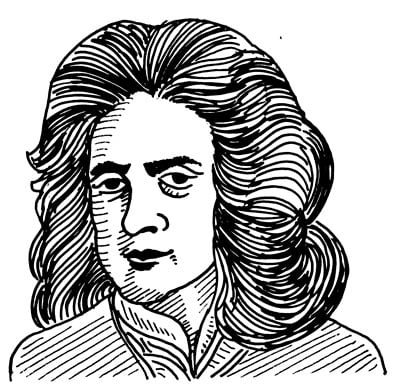
Isaac Newton (1641-1727) was born very premature and not expected to survive. It was said he could be fitted into a quart pot. His father had died three months earlier. When Isaac was three, his mother married a wealthy elderly clergyman from the next village, and went to live there, leaving Isaac behind with his grandmother. The clergyman died, and Isaac’s mother came back, after eight years, bringing with her three small children.
Two years later, Newton went away to the Grammar School in Grantham, where he lodged with the local apothecary, and was fascinated by the chemicals. The plan was that at age seventeen he would come home and look after the farm. He turned out to be a total failure as a farmer.
On returning to Cambridge in 1667, he began to work on alchemy, but then in 1668 Nicolas Mercator published a book containing some methods for dealing with infinite series. Newton immediately wrote a treatise, De Analysi, expounding his own wider ranging results. His friend and mentor Isaac Barrow communicated these discoveries to a London mathematician, but only after some weeks would Newton allow his name to be given.
This brought his work to the attention of the mathematics community for the first time. Shortly afterwards, Barrow resigned his Lucasian Professorship at Cambridge so that Newton could have the Chair. Newton left a mass of manuscripts on the subjects of alchemy and chemistry, then closely related topics. Most of these were extracts from books, bibliographies, dictionaries, and so on, but a few are original.
He began intensive experimentation in 1669, continuing till he left Cambridge, seeking to unravel the meaning that he hoped was hidden in alchemical obscurity and mysticism. He sought understanding of the nature and structure of all matter, formed from the ‘solid, massy, hard, impenetrable, movable particles’ that he believed God had created. Most importantly in the ‘Queries’ appended to ‘Opticks’ and in the essay ‘On the Nature of Acids’ (1710), Newton published an incomplete theory of chemical force, concealing his exploration of the alchemists, which became known a century after his death.
